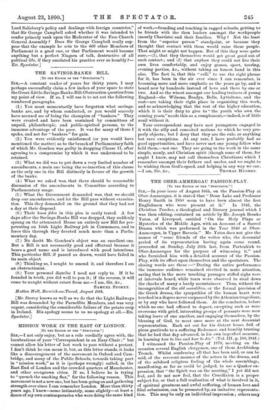MISSION WORK IN THE EAST OF LONDON.
[TO THE EDITOR OF THE " SPECTATOR:1
SIR,—I not only enjoy, but as a rule cordially agree with, the lucubrations of your "Correspondent in an Easy-Chair ;" but cannot allow his letter of last week to pass without a protest. I don't think he can mean it, but, as this letter stands, it looks like a discouragement of the movement in Oxford and Cam- bridge, and many of the Public Schools, towards taking part in"mission work," as it is (perhaps wrongly) called, in the East End of London and the Crowded quarters of Manchester, and other overgrown cities. If so, I believe he is trying to "quench the smoking flax," for the following reason. This movementis not a new one, but has been going on and gathering strength ever since I can remember London. More than thirty years ago, I knew—some intimately, some slightly—at least a dozen of my own contemporaries who were doing the same kind
of work,—founding and teaching in ragged schools, getting to be friends with the then leaders amongst the workpeople (mostly Chartists) and their families. Why ? Not the least from the "superior person" standpoint, or because they thought that contact with them would raise these people. That might or might not happen. But of this they were quite sure,—(1), that they themselves would get great good out of such contact ; and (2) that anyhow they could not live their own lives comfortably, and enjoy games, sport, touring, evening parties, &c., without taking an honest hand in this also. The fact is, that this "call," to use the right phrase for it, has been in the air ever since I can remember, is becoming more and more emphatic as the years go by, and is heard now by hundreds instead of here and there by one or two. And so the wisest amongst our leading trainers of young England—the Wilsons, Bradys, Bells, Lytteltons, and the rest—are taking their right place in organising this work, and so acknowledging that the rest of the higher education, which it is their duty to give to "the youth who own the coming years," needs this as a complement,—indeed, is of little avail without it.
Your correspondent may have met youngsters engaged in it with the silly and conceited notions to which he very pro- perly objects ; but I deny that they are the rule, or anything but rare exceptions. At any rate, I have probably had as good opportunities, and have never met one young fellow who held them,—not one. They are going to the work in the same simple, manly, and Christian spirit (though some of them, for aught I know, may not call themselves Christians) which I remember amongst their fathers and uncles, and we ought to be wishing them God's-speed, and helping in any way we car.


































 Previous page
Previous page